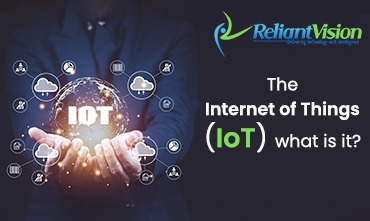The Internet of Things (IoT): what is it?
The Internet of Things (IoT) links devices, sharing data with the cloud. These devices, equipped with sensors and software, range from machines to consumer products. Businesses embrace IoT to enhance efficiency, customer service, decision-making, and overall value. IoT facilitates data transfer without human intervention. For instance, individuals using health trackers, smart thermostats, or connected cars are part of IoT. These objects exchange data effortlessly using Internet Protocol addresses. This network transforms industries, optimizing operations and enhancing customer interactions significantly. Reliant Vision offers the best IOT services.
How does IoT work as per experts of the Best IOT service provider?
In an IoT system, smart devices collect and respond to data using processors, sensors, and communication hardware. These devices connect to a central hub called an IoT gateway, where data is sent. Before sending, the data can be analyzed locally, saving bandwidth. These devices interact and process information without much human input, but users can set them up, give instructions, or access data. The connectivity and protocols used vary based on specific IoT applications. Moreover, IoT utilizes artificial intelligence and machine learning to improve data collection, making the process more straightforward and efficient says the Best IOT service provider.
Best IOT service provider.
What makes IoT significant?
IoT greatly enhances daily life and business productivity. People use IoT gadgets like cars and smartwatches for effortless tasks, such as opening the garage or adjusting home settings automatically. In the business world, IoT provides immediate data, improving efficiency, reducing costs, and enhancing services. It boosts transparency by providing valuable insights into customer behavior and market trends, giving companies a competitive advantage. As businesses understand IoT’s potential, it evolves, helping them stay competitive, adapt to market needs, and maximize the benefits of this transformative technology.
What are the advantages of IoT for businesses?
IoT offers numerous advantages to organizations, both tailored to specific industries and relevant across a wide range of sectors. These benefits encompass monitoring business operations, enhancing the customer experience, saving time and costs, increasing employee productivity, supporting adaptable business models, facilitating informed decision-making, and boosting revenue. It encourages businesses to reconsider their strategies, especially in sectors like manufacturing, transportation, and utilities, where sensors and IoT devices are prevalent. Its applicability extends to agriculture, infrastructure, and home automation. In agriculture, IoT streamlines farming by automating tasks based on data from sensors measuring factors like rainfall, humidity, temperature, and soil conditions. In infrastructure, IoT oversees structural changes, ensuring safety, improving incident management, reducing operational expenses, and elevating service quality. IoT efficiently manages mechanical and electrical systems in home automation and smart cities, contributing to energy efficiency and waste reduction. Its transformative influence extends to diverse industries, including healthcare, finance, retail, and manufacturing.
What are IoT’s benefits and drawbacks?
IoT offers several benefits, such as:
- Enables universal information access anytime, anywhere, on any device.
- Enhances communication among connected electronic devices.
- Optimizes data transfer, saving time and costs.
- Gathers extensive data, benefiting users and manufacturers.
- Analyzes data at its source, reducing cloud data transmission.
- Automates tasks, enhancing business services and reducing human intervention.
- Enables continuous, effective healthcare monitoring for patients.
Some drawbacks of IoT comprise the following:
- Rising connected devices increase cyber-attack vulnerability.
- Managing more IoT devices challenges data collection.
- System bugs disrupt networks by corrupting devices.
- The lack of international standards causes communication issues between devices.
IoT applications for consumers and businesses
The Internet of Things (IoT) is used in different areas:
- Consumer IoT: Smart homes have devices you can control remotely, making things like adjusting thermostats and using appliances more convenient.
- Wearable Devices: Wearables like smartwatches collect data, helping in emergencies by finding the best routes for responders and checking workers’ health signs.
- Healthcare: IoT helps closely monitor patients and manage hospital supplies more efficiently.
- Smart Buildings: Buildings adjust energy use based on how many people are inside, optimizing heating and cooling systems.
- Agriculture: Smart farming uses IoT to monitor fields, studying light, temperature, and soil moisture for better crop growth.
- Smart Cities: IoT sensors, found in streetlights and meters, improve city life by managing traffic, saving energy, tackling environmental issues, and maintaining sanitation.
IoT security and privacy concerns
The Internet of Things (IoT) connects billions of devices to the Internet, creating large amounts of data that require strong security. This widespread connectivity raises worries about the security and privacy of IoT. In 2016, a major attack happened when the Mirai botnet hacked into the domain name server provider Dyn, causing long-lasting system failures. The attackers took advantage of poorly secured IoT devices, resulting in one of the biggest denial-of-service attacks ever recorded. Mirai remains a threat as developers continue to work on it. Because IoT devices are interconnected, if there’s a single vulnerability, hackers can exploit it, making all data useless. Manufacturers who don’t update their devices are at risk from cybercriminals. Also, these devices often gather users’ personal information, making them attractive targets for hackers. Privacy concerns emerge as companies making consumer IoT devices might collect and sell users’ personal data, intensifying worries about data security.

